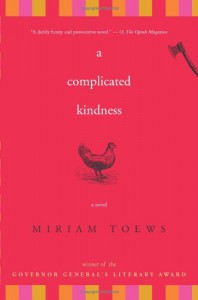A Complicated Kindness (Toews)

There is a chicken on the front cover of this novel, and an axe hovering threateningly in the upper corner. The relevance of these objects is explained early on - as an adolescent Mennonite girl in a closed community, our first-person narrator Nomi (a childish version of Naomi) has few options for her adulthood but to work for years in the chicken slaughterhouse that partially sustains her community. You wouldn't think there's much kindness associated with that theme, but of course there are degrees of kindness associated with the slaughter.
The novel shows teenage Nomi becoming increasingly rebellious against her hyper-restrictive religion, shaving her head, smoking weed, pursuing a sexual relationship and the like, as well as trying to deal with a seriously ill friend and the breakup of her (also rebellious) family. Her mother and sister are both gone elsewhere, separately, by the point in the narrative where we begin. All through the cruelties, mostly inflicted by the church but also by her boyfriend Travis, we see through Nomi's interested, imaginative eyes, and we're made aware of little, complicated kindnesses in her life.
But we're left with the most desolate image of all - Nomi excommunicate and alone in the house of her broken family, deserted by the last person she loves, her father, who departs the town rather than force his own shunning on her (or having it forced on them) in a final complicated act of kindness.
It is the brilliance of the observation, the quirkiness of the plot, and the honesty of the depiction of co-existing resilience, apathy and despair that we all experience to a degree as adolescents, that save this novel from being merely, as my generation would have called it, a "downer." As an insider's view of a little-known world, a foreign subculture set in the borderlands of Manitoba - with the different foreign-ness of the U.S. only a short drive away - I can very much see how this book fits well into the Canlit establishment's agenda of promoting any work that describes and celebrates Canadian diversity.
Fortunately, it's also an intriguing read with a strong female personal voice.



